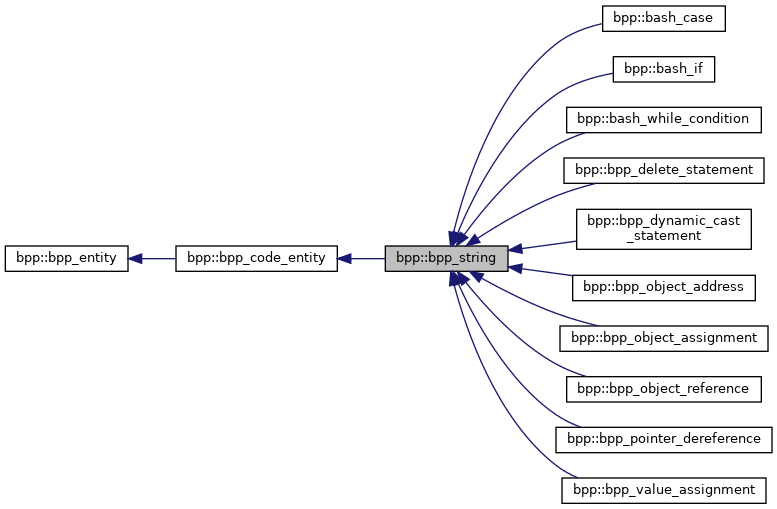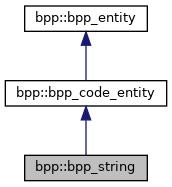The practical difference between bpp_code_entity and bpp_string is how we handle the code buffers. More...
#include <bpp.h>


Public Member Functions | |
| bpp_string () | |
| void | add_code (const std::string &code, bool add_newline=true) override |
| Add code to the primary buffer. | |
| void | add_code_to_previous_line (const std::string &code) override |
| Add code to the pre-code buffer. | |
| void | add_code_to_next_line (const std::string &code) override |
| Add code to the post-code buffer. | |
| std::string | get_code () const override |
| Return the contents of the main code buffer as a string. | |
| std::string | get_pre_code () const override |
| Return the contents of the pre-code buffer as a string. | |
| std::string | get_post_code () const override |
| Return the contents of the post-code buffer as a string. | |
 Public Member Functions inherited from bpp::bpp_code_entity Public Member Functions inherited from bpp::bpp_code_entity | |
| bpp_code_entity () | |
| bool | add_object (std::shared_ptr< bpp_object > object, bool make_local=false) override |
| Add an object to the code entity. | |
| virtual void | flush_nextline_buffer () |
| virtual void | flush_postline_buffer () |
| virtual void | flush_code_buffers () |
| virtual void | clear_all_buffers () |
| void | set_requires_perfect_forwarding (bool require) |
| bool | get_requires_perfect_forwarding () const |
 Public Member Functions inherited from bpp::bpp_entity Public Member Functions inherited from bpp::bpp_entity | |
| virtual | ~bpp_entity ()=default |
| virtual bool | add_class (std::shared_ptr< bpp_class > class_) |
| Add a class to this entity's list of classes. | |
| virtual std::shared_ptr< bpp_class > | get_class () |
| virtual std::string | get_address () const |
| virtual void | set_name (const std::string &name) |
| virtual std::string | get_name () const |
| virtual std::weak_ptr< bpp::bpp_class > | get_containing_class () |
| Get the class which contains this entity. | |
| virtual std::weak_ptr< bpp_program > | get_containing_program () |
| virtual bool | set_containing_class (std::weak_ptr< bpp::bpp_class > containing_class) |
| void | inherit (std::shared_ptr< bpp_entity > parent) |
| Inherit from a parent entity. | |
| void | inherit (std::shared_ptr< bpp_program > program) |
| virtual void | inherit (std::shared_ptr< bpp_class > parent) |
| void | set_definition_position (const std::string &file, uint64_t line, uint64_t column) |
| void | add_reference (const std::string &file, uint64_t line, uint64_t column) |
| bpp::SymbolPosition | get_initial_definition () const |
| std::list< bpp::SymbolPosition > | get_references () const |
| std::unordered_map< std::string, std::shared_ptr< bpp_class > > | get_classes () const |
| std::unordered_map< std::string, std::shared_ptr< bpp_object > > | get_objects () const |
| std::shared_ptr< bpp_class > | get_class (const std::string &name) |
| std::shared_ptr< bpp_object > | get_object (const std::string &name) |
| std::shared_ptr< bpp_class > | get_parent () const |
Additional Inherited Members | |
 Protected Attributes inherited from bpp::bpp_code_entity Protected Attributes inherited from bpp::bpp_code_entity | |
| std::shared_ptr< std::ostream > | code = std::make_shared<std::ostringstream>() |
| std::string | nextline_buffer = "" |
| std::string | postline_buffer = "" |
| bool | buffers_flushed = false |
| bool | requires_perfect_forwarding = false |
| Signals to bash_command_sequence entities whether they should operate in perfect forwarding mode I.e., whether this entity has special need to separate its pre- and post-code from its main code. | |
 Protected Attributes inherited from bpp::bpp_entity Protected Attributes inherited from bpp::bpp_entity | |
| std::string | name = "" |
| std::unordered_map< std::string, std::weak_ptr< bpp_class > > | classes |
| A map of class names to class objects within this entity. | |
| std::unordered_map< std::string, std::weak_ptr< bpp_object > > | objects |
| A map of object names to bpp_objects within this entity. | |
| std::unordered_map< std::string, std::shared_ptr< bpp_object > > | local_objects |
| Like objects, but only for objects whose scope is local to this entity. | |
| std::weak_ptr< bpp_class > | type |
| std::weak_ptr< bpp_class > | containing_class |
| std::weak_ptr< bpp_program > | containing_program |
| std::vector< std::weak_ptr< bpp_class > > | parents |
| std::weak_ptr< bpp_method > | overridden_method |
| bpp::SymbolPosition | initial_definition |
| std::list< bpp::SymbolPosition > | references |
Detailed Description
The practical difference between bpp_code_entity and bpp_string is how we handle the code buffers.
When you call add_code() on a bpp_code_entity, it will flush the pre_code and post_code buffers.
Meaning that we're treating the pre_code and post_code buffers as the pre- and post-code for this particular line of code. So when we finish writing this line of code, we should ensure that this line of code is preceded by its pre-code, and followed by its post-code
In a bpp_code_entity, the code:
echo @this.dataMember
Becomes:
{pre-code necessary to fetch @this.dataMember}
echo ${the resolved reference}
{post-code necessary to clear the memory}
In a bpp_string, however, calling add_code() does not ever flush those buffers. Why?
Because, if you imagine we're literally dealing with an actual string (although the same rules apply in some other cases), it's important not to muddy up the contents of the string with a bunch of pre- and post-code. If, for example, there are object references within the string, they should be resolved BEFORE the entire string, And cleared AFTER the entire string
This ensures that for a bpp_string, the code:
echo "This is a very long string
That spans multiple lines
And has a reference to @this.dataMember"
Becomes:
{pre-code necessary to fetch @this.dataMember}
echo "This is a very long string
That spans multiple lines
And has a reference to ${the resolved reference}"
{post-code necessary to clear the memory}
So, bpp_string gives us more direct control over where the pre- and post-code is added
In some other part of the compiler where we're parsing the above example string, the code might look something like:
entity->add_code_to_previous_line(pre_code);
entity->add_code_to_next_line(post_code);
^ These two lines prepare the code buffers in the code_entity
entity->add_code("echo \"This is a very long string....."); // etc
^ This line adds the code & *maybe* flushes the buffers we just prepared
Where "entity" may be a bpp_code_entity or a bpp_string
In general, parser rules which handle things such as object references don't pay attention to whether they're dealing with a bpp_code_entity or a bpp_string. The code necessary to fetch an object reference (for example) is simply added to the pre-code buffer, and the code necessary to clear that memory is simply added to the post-code buffer. The question of whether or when those buffers should be flushed is left to the entity itself (code_entity or string).
Constructor & Destructor Documentation
◆ bpp_string()
| bpp::bpp_string::bpp_string | ( | ) |
Member Function Documentation
◆ add_code()
|
overridevirtual |
Add code to the primary buffer.
- Parameters
-
code The code to add add_newline Ignored in the case of bpp_string
Reimplemented from bpp::bpp_code_entity.
◆ add_code_to_next_line()
|
overridevirtual |
Add code to the post-code buffer.
Reimplemented from bpp::bpp_code_entity.
◆ add_code_to_previous_line()
|
overridevirtual |
Add code to the pre-code buffer.
Reimplemented from bpp::bpp_code_entity.
◆ get_code()
|
overridevirtual |
Return the contents of the main code buffer as a string.
Reimplemented from bpp::bpp_code_entity.
◆ get_post_code()
|
overridevirtual |
Return the contents of the post-code buffer as a string.
Reimplemented from bpp::bpp_code_entity.
◆ get_pre_code()
|
overridevirtual |
Return the contents of the pre-code buffer as a string.
Reimplemented from bpp::bpp_code_entity.
The documentation for this class was generated from the following files:
- src/bpp_include/bpp.h
- src/bpp_include/bpp_string.cpp